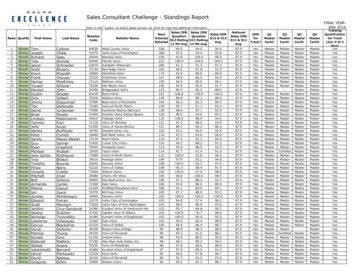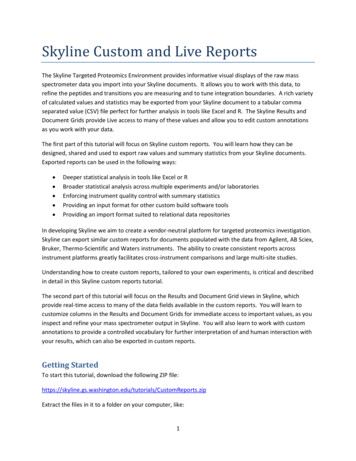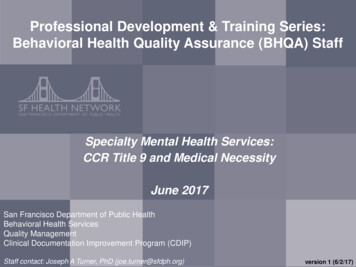
Transcription
PsychiatryClaims Data Snapshot
Introduction This publication contains an analysis of the aggregated data from MedPro Group’s casesclosing between 2011-2020 in which a psychiatrist is identified as the primary responsibleservice. A malpractice case can have more than one responsible service, but the “primary responsibleservice” is the specialty that is deemed to be most responsible for the resulting patient outcome. Our data system, and analysis, rolls all claims/suits related to an individual patient eventinto one case for coding purposes. Therefore, a case may be made up of one or moreindividual claims/suits and multiple defendant types such as hospital, physician, or ancillaryproviders. Cases that involve attorney representations at depositions, State Board actions, andgeneral liability cases are not included. This analysis is designed to provide insured doctors, healthcare professionals, hospitals,health systems, and associated risk management staff with detailed case data to assistthem in purposefully focusing their risk management and patient safety efforts.
Major allegations & financial severity60%% of case volume and total dollars paid55%52%50%45%40%38%35%Case volume30%Total dollars nvironmentOther**Multiple allegation types can be assigned to each case; however, only one “major” allegation is assigned that best characterizes theessence of the case. Medication-related allegations account for more than one-third of psychiatry cases, and a disproportionate share ofthe dollars paid. These cases tend to be complex to defend, and on average, are 38% are more expensive to resolve than the average ofall psychiatry cases. Patient environment cases reflect falls, assaults, and other general safety-related scenarios.MedPro Group closed cases, psychiatry as responsible service, 2011-2020 (N 275); *Total dollars paid expense indemnity; **Other includes allegations for which no significant case volume exists
Most common allegation details Medication-related cases mostcommonly involve managementof antidepressant andantipsychotic medicationregimens. Inadequate monitoring of theeffects of the regimen, decisionmaking as to the mostappropriate medication for thepatient’s condition, andsuboptimal patient/familyeducation about the risks of themedication are often identified. Diagnosis-related allegationsinvolve delays in diagnosingdepression associated withsuicidal ideation, cardiacconditions associated withmedications, & other drugtoxicities These cases reflect narrowdiagnostic focus, inadequatepatient assessments, especiallyas symptoms are escalating, andfailed communication amongproviders, particularly whenreporting and/or following throughon diagnostic test results.MedPro Group closed cases, psychiatry as responsible service, 2011-2020 Medical treatment allegationsreflect issues with overallmanagement of the patient’scourse of treatment. Included arescenarios involving prematureend of treatment (abandonment). These cases reflect patientbehavioral issues (including nonadherence to treatment), andsub-optimal communicationamong members of the patient’scare team.
Clinical severity*Clinical severity categoriesSub-categories% of casevolumeEmotional Injury OnlyLOWMEDIUM26%DefinitionsMental distress or suffering that is generally temporary; includes HIPAA violations,discrimination, involuntary stayTemporary Insignificant InjuryLacerations, contusions, minor scars or rash, where no delay in recovery occursTemporary MinorInfection, fracture set improperly or a fall, where recovery is complete but delayedTemporary Major24%Burns, drug side effect; recovery delayedPermanent MinorLoss of fingers or loss or damage to organs; includes non-disabling injuriesSignificant Permanent InjuryDeafness, loss of limb, loss of eye or loss of one kidney or lungMajor Permanent InjuryHIGHParaplegia, blindness, loss of two limbs or brain damage50%Grave Permanent InjuryQuadriplegia, severe brain damage, lifelong care or fatal prognosisDeathDeath40%% of case volume resulting in patient death;In 22% of these cases, suicide or attempted suicide was noted as the injury.Typically, the higher the clinical severity, the higher the indemnity payments are and the more frequently payment occurs.MedPro Group closed cases, psychiatry as responsible service, 2011-2020; *National Association of Insurance Commissioners rating scale5
Claimant type & locationAmbulatory: 55%Inpatient: 41%Location% of case volumeOffice/clinic48%Patient room29%Extended care facility5%Mental health/substanceabuse facility4%Emergency department4%Other*10%Emergency: 4%MedPro Group closed cases, psychiatry as responsible service, 2011-2020; *Other includes locations for which no significant case volume exists6
Contributing factorsContributing factors are multi-layered issues or failures in the process of care that appear tohave contributed to the patient outcome, and/or to the initiation of the case, or had a significantimpact on case resolution.Multiple factors are identified in each case because generally, there is not just one issue thatleads to these cases, but rather a combination of issues.Contributing factors reflect both provider and patient issues, but are not programmaticallyassigned to specific individuals. They denote breakdowns in technical skill, clinical judgment,communication, behavior, systems, environment, equipment/tools, and teamwork. The majorityare relevant across clinical specialties, settings and disciplines; thus, they identify opportunitiesfor broad remediation.CRICO Strategies. (2020). The Power to Predict: Leveraging Medical Malpractice Data to Reduce Patient Harm and Financial Loss. Retrieved from lBenchmark-Reports/The-Power-to-Predict
Top* contributing factor categories by allegation100%92%87%90%% of case volume with these factorsMedication-related80%70%Medical treatment66%60%58%57%50%47% orrelatedDocumentationAdministrativeMore than one factor per case is usually present, therefore totals will not equal 100%.MedPro Group closed cases, psychiatry as responsible service, 2011-2020; *Those present in / 10% of case volume in at least one allegationClinicalsystems
Contributing factors: most common factor details in psychiatrycasesAdministrativeInadequate staff training/education, credentialing issues, failure to follow policies/proceduresBehavior-relatedPrimarily involves patient non-adherence to follow-up and with treatment regimen, and patientdissatisfactionClinical judgmentInadequate assessments; these include history & physicals, failures to appreciate/reconcile patientsigns/symptoms/test results (sometimes resulting in premature discharge from care), failures/delays inseeking consults, narrow diagnostic focus, delays in ordering diagnostic testing, decision-making aboutlocation of care (inpatient vs ambulatory settings)Clinical systemsReflective of delays in scheduling/performing/reporting diagnostic testing, and general failures in thesystem for patient care (including patient follow-up)CommunicationSuboptimal communication among providers regarding patient condition, inadequate patient educationabout medications, and failures to manage patient expectationsDocumentationInsufficient/lack of documentation leading to difficult defense of casesMedPro Group closed cases, psychiatry as responsible service, 2011-2020
Factors predictive of cases closing with indemnity paidCRICO Strategies analyzed 37,000 cases* to determine which breakdowns in health careprocesses indicate the highest odds of a case closing with an indemnity payment.AdministrativeClinical JudgmentDocumentationFailure to have or followa policy or protocolPatientassessment failuresAbsent or insufficientdocumentation2.451.851.76ODDS RATIOODDS RATIOODDS RATIO*All specialties, closed between 2014-2018; CRICO Strategies. (2020). The Power to Predict: Leveraging Medical Malpractice Data to Reduce Patient Harm and Financial Loss. Retrieved nnual-Benchmark-Reports/The-Power-to-Predict; MedPro Group is a member of CRICO Strategies’ Community Benchmarking System (now known as CandelloCompare) which represents 30% of all US MPL cases.
Psychiatry: where to focus your efforts Conduct an appropriate and thorough assessment of the patient. Update and review medical, medication, and family history at every visit to ensure the best decision-making. Maintain problem lists. Communicate with each other. Focus on care coordination if other specialties are involved, including next steps and determining who is responsible for thepatient. Give thorough and clear patient instructions. Engage patients as active participants in their care. Consider the patient’s health literacy and other comprehension barriers. Recognize patterns of patient non-compliance, and focus on documentation of efforts made to encourage compliance and followup with treatment. Document. Verify that documentation supports the clinical rationale for the method of treatment. Describe the rationale for inclusion/exclusion of differential diagnoses. Timely document thorough, objective information about the results of patient assessments, education of the patient/family abouttreatment plans - including medication regimens, and any instances of patient nonadherence. Thorough, consistent documentation in the chart enhances communication between providers and provides a supportiveframework for defense of any subsequent malpractice case.
MedPro Group dataMedPro is partnered with Candello, a national medical malpractice data collaborative and division of CRICO, the medical malpracticeinsurer for the Harvard-affiliated medical institutions.Derived from the essence of the word candela, a unit of luminous intensity that emits a clear direction, Candello’s best-in-classtaxonomy, data, and tools provide unique insights into the clinical and financial risks that lead to harm and loss.Using Candello’s sophisticated coding taxonomy to code claims data, MedPro is better able to highlight the critical intersectionbetween quality and patient safety and provide insights into minimizing losses and improving outcomes.Leveraging our extensive claims data, we help our insureds stay aware of risk trends by specialty and across a variety of practicesettings. Data analyses examine allegations and contributing factors, including human factors and healthcare system flaws that result inpatient harm. Insight gained from claims data analyses also allows us to develop targeted programs and tools to help our insureds minimizerisk.DisclaimerThis document should not be construed as medical or legal advice. Because the facts applicable to your situation may vary, or the laws applicable inyour jurisdiction may differ, please contact your attorney or other professional advisors if you have any questions related to your legal or medicalobligations or rights, state or federal laws, contract interpretation, or other legal questions.MedPro Group is the marketing name used to refer to the insurance operations of The Medical Protective Company, Princeton Insurance Company,PLICO, Inc. and MedPro RRG Risk Retention Group. All insurance products are underwritten and administered by these and other BerkshireHathaway affiliates, including National Fire & Marine Insurance Company. Product availability is based upon business and/or regulatory approvaland may differ between companies. 2022 MedPro Group Inc. All rights reserved.12
MedPro advantage: online resourcesFind us online atwww.medpro.com/dynamic-risk-toolsTools & resourcesEducational opportunitiesFollow MedPro on LinkedIn and Twitter(@MedProProtector)Education Materials and resources to educate followersabout prevalent and emerging healthcare risksAwarenessConsulting informationVideoseRisk Hub Cybersecurity Resource Information about current trends related topatient safety and risk managementPromotion Promotion of new resources and educationalopportunities
MedPro Group is the marketing name used to refer to the insurance operations of The Medical Protective Company, Princeton Insurance Company, PLICO, Inc. and MedPro RRG Risk Retention Group. All insurance products are underwritten and administered by these and other Berkshire Hathaway affiliates, including National Fire & Marine Insurance Company.











